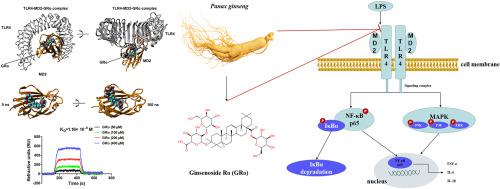Journal of Ginseng Research ( IF 6.8 ) Pub Date : 2021-06-05 , DOI: 10.1016/j.jgr.2021.05.011 Hong-Lin Xu 1 , Guang-Hong Chen 1 , Yu-Ting Wu 1 , Ling-Peng Xie 1 , Zhang-Bin Tan 1, 2 , Bin Liu 1, 2 , Hui-Jie Fan 1, 3 , Hong-Mei Chen 1 , Gui-Qiong Huang 4 , Min Liu 5 , Ying-Chun Zhou 1

|
Background
Panax ginseng Meyer (P. ginseng), a herb distributed in Korea, China and Japan, exerts benefits on diverse inflammatory conditions. However, the underlying mechanism and active ingredients remains largely unclear. Herein, we aimed to explore the active ingredients of P. ginseng against inflammation and elucidate underlying mechanisms.
Methods
Inflammation model was constructed by lipopolysaccharide (LPS) in C57BL/6 mice and RAW264.7 macrophages. Molecular docking, molecular dynamics, surface plasmon resonance imaging (SPRi) and immunofluorescence were utilized to predict active component.
Results
P. ginseng significantly inhibited LPS-induced lung injury and the expression of pro-inflammatory factors, including TNF-α, IL-6 and IL-1β. Additionally, P. ginseng blocked fluorescence-labeled LPS (LPS488) binding to the membranes of RAW264.7 macrophages, the phosphorylation of nuclear factor-κB (NF-κB) and mitogen-activated protein kinases (MAPKs). Furthermore, molecular docking demonstrated that ginsenoside Ro (GRo) docked into the LPS binding site of toll like receptor 4 (TLR4)/myeloid differentiation factor 2 (MD2) complex. Molecular dynamic simulations showed that the MD2-GRo binding conformation was stable. SPRi demonstrated an excellent interaction between TLR4/MD2 complex and GRo (KD value of 1.16 × 10−9 M). GRo significantly inhibited LPS488 binding to cell membranes. Further studies showed that GRo markedly suppressed LPS-triggered lung injury, the transcription and secretion levels of TNF-α, IL-6 and IL-1β. Moreover, the phosphorylation of NF-κB and MAPKs as well as the p65 subunit nuclear translocation were inhibited by GRo dose-dependently.
Conclusion
Our results suggest that GRo exerts anti-inflammation actions by direct inhibition of TLR4 signaling pathway.






























 京公网安备 11010802027423号
京公网安备 11010802027423号